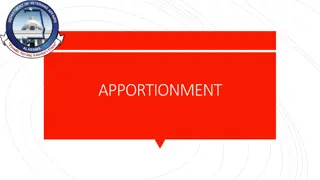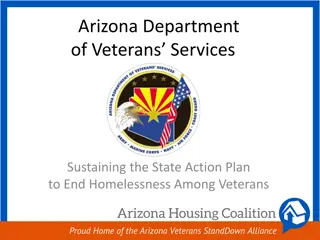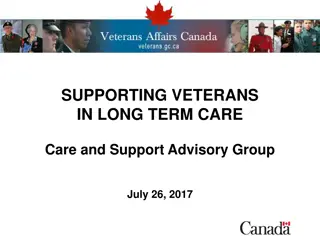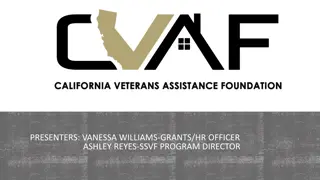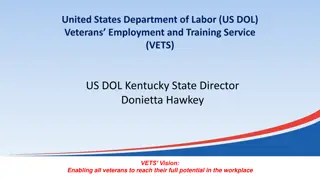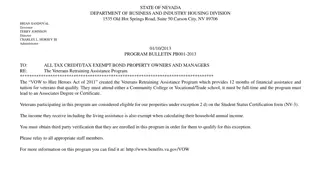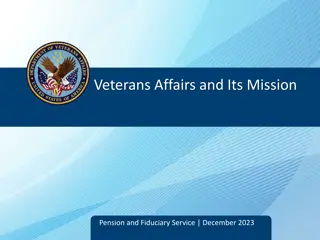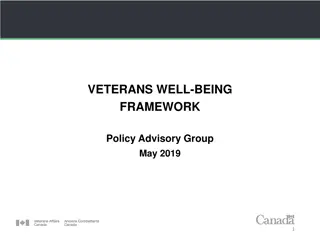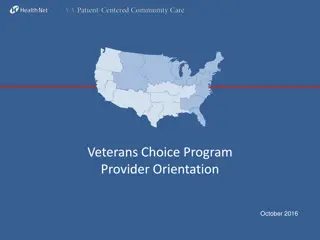Supporting Veterans in Low-Demand Housing Programs
This content discusses key aspects of programming for low-demand housing programs aimed at assisting veterans with housing stability. It emphasizes the importance of avoiding assumptions, offering a variety of meaningful activities, and focusing on getting and staying housed rather than treatment. Additionally, it highlights working with veterans in early recovery stages, setting realistic goals, and providing support in the housing process.
Download Presentation

Please find below an Image/Link to download the presentation.
The content on the website is provided AS IS for your information and personal use only. It may not be sold, licensed, or shared on other websites without obtaining consent from the author. Download presentation by click this link. If you encounter any issues during the download, it is possible that the publisher has removed the file from their server.
E N D
Presentation Transcript
Programming for Low Demand Housing Programs Paul Smits, LCSW Senior Policy Analyst University of South Florida M. Scott Young , PhD Research Assistant Professor University of South Florida 1
Overview An Assumption about Programming to Avoid Are Groups and Classes Compulsory? Focus on Getting and Staying Housed Instead of Treatment Working with Veterans in the Earliest Stages of Recovery and Stages of Change Helping Veterans to Establish Personal and Workable Goals Assisting Veterans Who Have Lost Their Housing Multiple Times Due to Money Management Issues Typical Programs, Groups, and Classes Core Values of Programming in Low Demand Programs 2
An Assumption to Avoid Low Demand does not mean that clients are not interested in participating in services, classes, groups, and/or other structured activities Be proactive in providing a variety of meaningful activities Routinely post, update, and announce the schedule activities Be proactive in engaging residents in services, classes, groups, and/or other activities 3
Are Groups and Classes Compulsory? A core value of the Low Demand Model is to encourage but not demand Negative sanctions, especially dismissal from the program, should not be used to motivate residents to attend programming and classes Don t wait for residents to come to your group or class, reach out and engage them, make them feel welcome Help the resident find groups and classes that are meaningful to them 4
Focus on Getting and Staying Housed Instead of Treatment Keep the program focused on assisting Veterans with the challenges of accessing and getting what they need to move onto permanent housing Housing application Housing search Finances Resolving legal issues Acquiring basic household items Emotional and social support for the process 5
Working with Veterans in the Earliest Stages of Recovery and Stages of Change Listen to the resident s goals Build trust Keep the steps small and the goals realistic Reinforce the small steps of recovery goals Support residents through the predictable setbacks and help them stay focused on THEIR goals 6
Helping Veterans to Establish Personal and Workable Goals Residents in early recovery are often in a pre- contemplative stage of change Be patient while residents determine if this program will work for them Listen to the resident s goals for achieving housing stability Negotiate reasonable goals that can be achieved Seize opportunities to provide reinforcement and support for each small step of goal achievement 7
Assisting Veterans Who Have Lost Their Housing Multiple Times Due to Money Management Issues One of the top reasons that residents lose housing Budgeting and money management classes Harm reduction approaches to financial management Help residents accept fiduciary services More details in: Quick Guide to Assist Homeless Veterans with Financial Management and Fiduciary Services : https://www.va.gov/HOMELESS/nchav/models/GPD-LD_TA.asp 8
Typical Programs, Groups, Classes, and Structured Activities Provided in Low Demand Homeless Programs Housing Options and Process Financial Management and Budgeting Repairing Credit Securing Furniture and Household Items Managing Addiction and Mental Health Issues Relapse Management Building a Satisfying Social Life and Leisure Time Addressing Spiritual Needs 9
Programming Continued Social Events and Outings Anger Management Securing Income through Employment and/or Benefits Nutrition and Cooking for One Managing the Landlord/Tenant Relationship Legal Assistance and Resolving Warrants, Child Support Arrears, and Past Debts Overdose Kits and Preventing Death from Overdoses 10
Core Values of Programming in Low Demand Housing Programs Encourage Engage Motivate But Do Not Force or Apply Negative Sanctions 11







